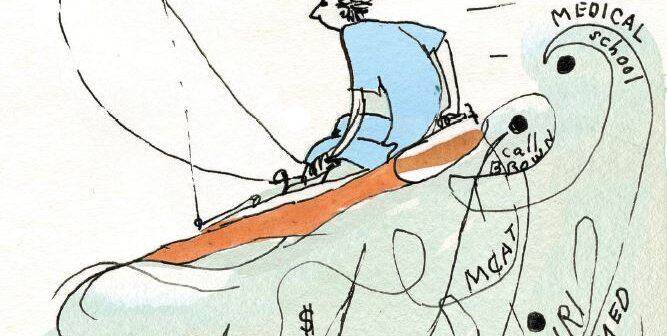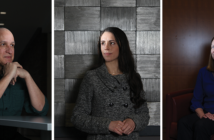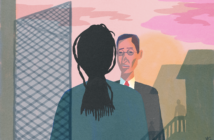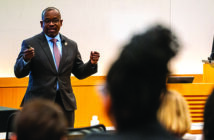An untraditional medical school offers a chance for a second career to a non-traditional student.
If you get to be 50 or 60 years old, some certain age when you look back at your life, you may discover a pivotal moment—or two, or more—that propelled the arc of your life, moments that fit together over time to make your history. I refer not to events that happen to you, such as a sprained ankle, or a flat tire. Instead, I speak of moments when you yourself handled a situation, when you acted overtly, whether out of apparent necessity, or on an impulse springing unconsciously into awareness. You may see, in the rearview mirror of time, how your actions, or words, set in motion a cascade of events that became the infrastructure of, well, your life.
In mid-October 1974, I told my wife, Polly, that I was ready for a new career. I’d just begun my fifth year as a middle school science teacher and needed a change. I’d come to find the generally repetitive nature of teaching dull and I no longer felt as inspired to teach as I once had. And, now that I had children to consider, if I continued teaching the financial rewards would always be a limiting factor. I’d also begun to think that if I stayed in education, I would want more, to be a principal or a superintendent. A greater role, with more status, more prestige. I kept my reasons to myself, though, only telling her that I wanted to make a change.
Polly was a bit startled by my sudden declaration. “I thought you liked teaching,” she said, “but it’s up to you.” We were young and a bit carefree about the future. Hippie days after all. Then, in retrospect, she pushed us into the unpredictable, saying: “Take some time to think about it. I’ll figure out something to do with the girls and you can have the afternoon to yourself.”
And so, for what turned out to be not one but three Saturday afternoons, Polly generously took the girls, ages 1 and 3, while I took a few hours to myself. I walked the half-mile from our little Cape-style house down to the path that runs alongside the fashionable Clambake Club on Easton’s Point. Straddling the eroding pathway, and dodging the fading poison ivy, I balanced my way down to the rocky shore where I perched myself to watch the waves and to think.
Over Sunday night pizza at our kitchen table, our little girls’ faces smeared red with tomato sauce, I, somewhat proudly, told Polly that I had come up with four ideas (yes, four!) from my ocean-side meditations. I casually tossed out my first option. “Everyone is into gardening now, we all have houseplant jungles in our homes, right? And Bellevue Feed and Seed, where everyone goes, is run by that older guy, you know, Frank, and maybe I could learn the business from him, then buy it from him later on.” Polly waited patiently as I finished my monologue.
“Retail? Really? Day after day? I can’t see it for you. I think you’d be bored pretty quickly.”
Noticing my dismay, she added, kindly, “Sorry.”
Idea number two was opening an aquarium in Newport that would be a big tourist draw.
“An aquarium? That sounds like a huge deal, one that would require lots of upfront money. Chances are it would never get done,” Polly said. I’d asked for her thoughts, and she was sympathetic but not reluctant in her assessments, which hit the mark, I had to admit.
Feeling defensive, I forged ahead, rambling in nervousness. “We could move to Vermont or New Hampshire, and get a farm where we can grow produce …”
“Realistically, that would never work out,” Polly said, “and, frankly, I wouldn’t be happy and I don’t think you would be either.” She’s right, I had to agree.
I hesitated, down to my last shot. “Well then,” I said, “maybe I could be a doctor.” Just like that, no elaboration at all, since I had not thought about it in any detail.
Polly’s eyes grew wide and the corners of her mouth turned up. “Yes … yes.” She paused and thought. “I can see you doing that. It seems more real to me and it’s something that I can understand. I think you’d be good at it. And your mother would love it!”
As naïve as it sounds, that’s how we began to change our lives, in the fall of 1974. Over the next few months, when we had time or felt like it, we filtered through the problems facing us, and possibly our own doubts. After all, we did have a couple of major hurdles to jump.
Money came first: how to finance a full year while I took pre-med classes? With only minimal hesitation, we decided we could withdraw all the money from my school retirement fund, and take out the money we had put aside for the children’s education. Polly offered to waitress during the summer. It would be tight, but doable, our optimism boosted by the enthusiasm of the inexperienced.
A second major issue was the med school application process. The goal, assuming I could even get into a program, was to start in July 1976; otherwise I’d waste an entire year. That meant I had to apply in the upcoming fall, only a few months away. But I first had to take the MCAT exam in September, and to do that, I would need to learn organic chemistry. Signing up for organic in the upcoming summer, after my teaching year ended, would be our first definitive action. All of which seemed a bit daunting. So, before we got to the go/no go point of an organic course, we decided to gauge the likelihood of my even getting into med school.
OBSTACLES
One Thursday in April 1975 I played hooky from teaching, and drove off in our army-green VW for a two-day trip. Later that day I would meet with the medical school admissions director at the University of Vermont, and on Friday, I would drive to Hanover, NH, to spend an hour with Dartmouth’s dean of admissions. I drove away with the promise of adventure, but returned home with the logic of reality—my age—weighing on me. I summarized for Polly. “They think I’m too old to get accepted. Being over 30 when I’d start is likely a deal breaker for most admission committees,” I told her, dejected. “Now what?”
“Call Brown,” Polly said, almost reflexively. “Call Brown,” she repeated when I stayed inside myself and seemed not to hear her. “Just do it, right now,” she insisted, her eyebrows raised, her chin forward and her arms akimbo, her physical attitude making her imperative clear. “Why not?” she added, forcing my hand. I have no explanation, none at all, why Brown University had never entered my thinking about medical school. Perhaps growing up Catholic in Rhode Island meant that secular institutions like Brown were just not a consideration like Notre Dame or Boston College. Still, I snatched the black rotary phone from the kitchen wall, and was soon enough transferred to the admissions office.
“Hello, this is Cindy Ronan, secretary for the Brown Medical School Admissions Committee. What can I do for you today?”
I catapulted through my storyline: education and GPA, Army and teaching experience, trying my best to impress. Wrapping a neat summary, projecting confidence, or faking it. I paused. She said, “That all sounds really good. From what you say, I think you will surely be competitive.” Not registering her words, I offered to drive up, “anytime at all,” to make my case in person. Her voice was firm but reassuring. “That won’t be necessary. Truly. Our dean is very focused on applicants just like you, people with experience in the real world.” Just like that. Boom. The optimism of hope supplants grim discouragement. After the call finished, Polly and I grinned at each other across the kitchen. Silent congratulations. One barrier crossed because of a simple phone call. Next, organic chemistry.
I found a class at the community college in Providence, and one Friday, after my final day of teaching, I drove up for a 3 p.m. class. When the professor materialized, at almost 3:20, he stood in the doorway and said, “There are only seven of you. We need 10. Class is canceled, refunds through the bursar’s office.” Then he vanished. Disappeared. And like a mirage, my plans evaporated, too. No organic? My head buzzed, my mind blank.
The next thing I recall is aiming the VW down 95 South, on the other side of Narragansett Bay from my home, targeting the URI campus in my sights, almost an hour away. I marched into the registrar’s office at the URI admin building at 20 minutes to 5, the weekend close at hand. A pleasant woman, about mid-50s in age, still modeling a Jackie O bouffant, looked at me and then glanced at the wall clock.
“I want to register for session one of organic chemistry. Here’s my payment,” I announced, firmly. I put my check on the counter and slid it forward.
Impassively she said, “This is the last day for drop-add,” eyeballing the clock again, and showing me a drop-add form.
“I know it’s late, but I need the class,” I said. Impulsively, not thinking, I pushed my check toward her, under the metal cage between us, and at the same time gently tugged the drop-add paper out of her grasp. “I’ll be here first thing Monday morning,” broadcasting positivity.
The nice lady opened her mouth to protest, but instead peered down at my check in her hand. That distraction was all I needed. “Thanks, this is terrific of you. You’ve got the money and I’ll get the signature.”
My actions were unexpected, even to me. But my motivation was clear and strong, putting me on autopilot.
Now I had to make up for missing the first week of class. For the next three days the public library became my study hall. All day. Short breaks for an apple or half a bologna and cheese sandwich.
Intent and focused, everything on the line, I taught myself from the text, drawing images and writing formulae, taking notes and highlighting in yellow. As if my life depended on it, which, of course, it did.
Surprising even myself, I got an A on that first test. My brother-in-law was taking organic for vet school, and he was reportedly furious I had done better than he, despite missing the first week. We became friendly lab partners, though, working together to finish our weekly afternoon lab in time to sail with Polly’s father in the Wednesday evening races in Newport’s famous harbor. I finished with an A for that first organic course.
The MCATs would be next, followed by five pre-med courses at URI, in the fall and spring semesters. I had set myself a timeline for getting applications submitted as early as possible to various med schools. Like a good sailor at the helm of his boat, surging forward on a broad reach, fresh wind filling his sails, I began to sense that I might hear the gun crack from the committee boat when I crossed the finish line.
1976: A NEW LIFE
The following February—10 months after initial disappointment, eight months after starting organic, two months after multiple med school interviews—I sauntered into our kitchen, another day of classes and labs at URI done and gone. Polly used her eyes to direct me to a thick, white business envelope on the kitchen table. Unopened. With a Brown insignia in the corner. Our girls were playing with pots and pans on the floor. I brought the envelope back to Polly. “You open it. It’s as much yours as mine.”
“Nope, let’s do it together,” she said. We wrestled with the envelope, laughing but tense. “And the Oscar goes to …”
Three weeks after that we hosted a celebratory party. And that July, right on schedule, we moved to Providence, on 8th Street, just behind a little French bakery, our house on a direct bus route to the Brown campus.
Looking back, I have a couple of certain conclusions about all that happened back then. For me, necessity is not the mother of invention. It is, rather, the mother of twins: motivation and action. Having the courage of a conviction (however born) is one thing. But to be consequential, it must induce action (however accomplished). Moreover, thinking about those days with the wisdom that only experience can deliver, it is clear that two heads are better than one, particularly if one is named Polly. When the time comes to step boldly into the crucible of life, a good partner is best of all.
And to this day, we often say, “Call Brown,” when faced with a tough decision.
Or just for fun.




